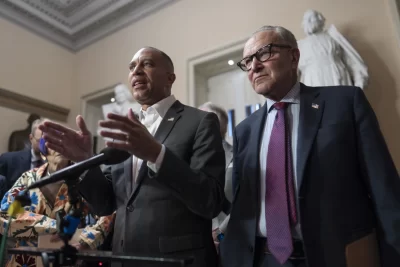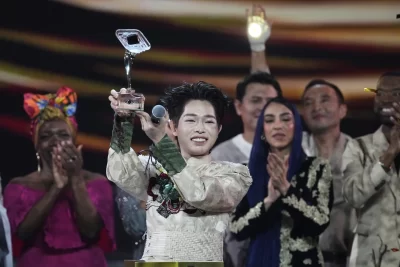
MAULDIN, S.C. — Hillary Clinton. Nancy Pelosi. Kamala Harris. Liz Cheney. Carly Fiorina. And for now, Nikki Haley.
The former South Carolina governor is the latest in a long line of women — historically some of Republican Donald Trump’s most stubborn challengers — for whom the former president saves a special playbook. It’s centered around intimidation, combined with a now-familiar brand of vulgarity, nicknames and other insults he deploys for men, too.
But where he tries to emasculate his male opponents, Trump works in put-downs about the appearance of women, their emotional balance and their intelligence. He mispronounces their names. He seemed to confuse two politicians who are women. And he questions their right to challenge him.
Trump’s nickname for Haley, a Republican who served as his own ambassador to the United Nations, is “Birdbrain.”
“Who the hell was the impostor?” Trump railed after the New Hampshire primary against Haley, who acknowledged his victory but has refused to drop out of the GOP presidential nomination fight. “When I watched her in the fancy dress that probably wasn’t so fancy, I said, ‘What’s she doing? We won.’”
Haley, who lost in Iowa and New Hampshire but has vowed to stay in the race through her home state’s first-in-the-South GOP primary Feb. 24, shot back that Trump threw a “tantrum” because he feels threatened.
“It’s not just that he’s running against Nikki Haley,” said Debbie Walsh, director of the Center for American Women and Politics at Rutgers. “It’s because she’s even deigning to challenge him … He goes after women for their appearance, for their gender.”
In fact, Trump has bragged about dominating women, an assumption challenged when one refuses to step aside.
“You can do anything” to women when you’re famous, Trump said on the “Access Hollywood” tape that threatened his 2016 campaign. And yet Trump defeated Clinton with 39% of women voters casting their ballots for him. Trump’s share of women voters increased in 2020 to 44%, even as he lost to President Joe Biden — in part because Biden gained support among men, according to a Pew Research Center survey of people confirmed to have voted in those elections.
Haley, for her part, has mostly taken Trump’s sexism in stride. She told CNN on Sunday that he was respectful to her when she served as his ambassador to the United Nations, but now is “flawed.”
A spokesperson for the Trump campaign did not respond to a request for comment.
Here’s a look at Trump’s approach to women he sees as obstacles and the latest reactions in the 2024 campaign.
She was a “nasty woman,” didn’t look presidential and her voice gave Trump a headache, according to Trump.
But the defining visual of Trump’s approach to Clinton, his Democratic rival in the 2016 presidential election, came at a debate Oct. 9, 2016, in St. Louis, Missouri, two days after The Washington Post reported the contents of the “Access Hollywood” tape.
As Clinton answered questions during the town hall-style event, the 6-foot-3 Trump repeatedly hovered over and behind the 5-foot-5 former senator and secretary of state. He loomed so close, she wrote later, “my skin crawled.”
During a rally in North Carolina a few days after the debate, Trump appeared to hark back to the moment. “When she walked in front of me. Believe me, I wasn’t impressed,” he said.
Trump as president called the House speaker, “Crazy Nancy,” refusing to shake her hand at the State of the Union address after the House had impeached him.
She called him worse things — questioning his “manhood” in one meeting with Democrats, “ as if manhood could ever be associated with him.”
In 2019, she issued a smirk-and-clap to him when he arrived to deliver the State of the Union speech, a moment preserved in an iconic photo. The next year, she openly scoffed at him on-camera as he spoke. Then she ripped up a copy of his speech on-camera behind his back and held up the pieces for all to see.
Haley has stepped up her questions about Trump’s mental fitness since a Jan. 19 speech when he repeatedly seemed to confuse her with Pelosi. She uses it to highlight her calls for mental competency tests for politicians — her way to highlight both Trump’s and Biden’s ages (77 and 81, respectively).
Trump barely mentioned Democratic Sen. Tim Kaine when he was Clinton’s running mate in 2016. But four years later, the president had plenty to say about Biden’s vice presidential pick, Kamala Harris.
Trump almost immediately called her “nasty,” and said that “nobody likes” Harris. That comment taps into a common standard of likability that is applied to women in leadership far more often than men. He also told voters in North Carolina it would be “an insult to our country” if Harris became the first female president.
LIZ CHENEY
Former Republican Rep. Liz Cheney of Wyoming continues to draw Trump’s wrath even after she lost her House seat in a primary last year.
Cheney was one of 10 House Republicans who voted to impeach Trump after the Jan. 6 insurrection at the U.S. Capitol building, and she’s declared it her mission to prevent Trump from returning to the presidency. Doing so, she warned late last year, would mean the U.S. could become a dictatorship. Trump called her, “Crazy Liz Cheney.”







